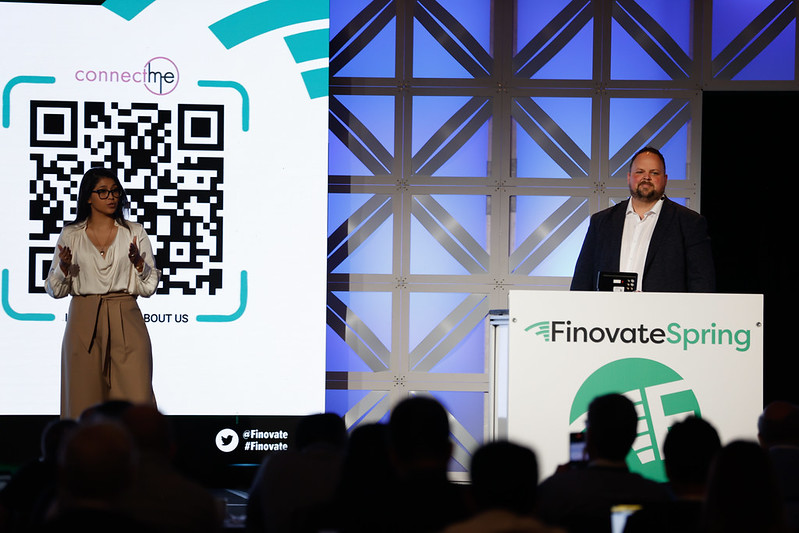
With FinovateSpring only days away (May 23 through May 25), this week’s edition of Finovate Global will showcase those innovators demoing at the event that are headquartered outside the United States.
There’s still time to register and join us in San Francisco, California for our annual Spring fintech conference. Visit our FinovateSpring 2023 hub today and get your ticket today!
9Spokes
Founded in 2012 and headquartered in New Zealand, 9Spokes unlocks open banking and data, giving financial institutions a powerful set of tools to engage SMB customers. LinkedIn.
FinTech Insights by Scientia
Founded in 2016 and headquartered in London, U.K., FinTech Insights by Scientia offers a competitive analysis tool for banks and fintechs to help them create compelling digital banking experiences. LinkedIn.
FINTEQ
Founded in 2017 and headquartered in Poland, FINTEQ removes credit risk from the supply chain, giving suppliers a healthy and sustainable trade finance alternative. LinkedIn.
Flybits
Founded in 2013 and headquartered in Toronto, Canada, Flybits offers a personalization platform that enables financial institutions to deliver best-in-class personalized digital banking experiences. LinkedIn.
Fundica
Founded in 2017 and headquartered in Montreal, Canada, Fundica is a government funding platform used by some of the largest financial institutions in North America to acquire clients at scale. LinkedIn.
Horizn
Founded in 2012 and headquartered in Toronto, Canada, Horizn helps financial institutions maximize the impact of digital and accelerate returns on digital investments with customers and employees. LinkedIn.
HyperSwitch
Founded in 2022 and headquartered in India, HyperSwitch is an open source payments switch designed to make payments fast, reliable, and affordable. LinkedIn.
Kani
Founded in 2018 and headquartered in Newcastle, U.K., Kani offers end-to-end reconciliation and reporting, automating the back office for payments companies and fintechs, and ensuring accuracy and compliance. LinkedIn.
Lucinity
Founded in 2018 and headquartered in Reykjavik, Iceland, Lucinity combats financial crime with innovative GenAI technology for smarter and faster FinCrime compliance. LinkedIn.
PayTic
Founded in 2020 and headquartered in Charlottetown, Canada, PayTic is a SaaS platform that automates and manages all key aspects of program management: network fees, reconciliation, reporting, and fraud. LinkedIn.
SESAMm
Founded in 2014 and headquartered in Metz, France, SESAMm specializes in big data and artificial intelligence, providing analytics from more than 20 billion articles and messages using NLP. LinkedIn.
Here is our look at fintech innovation around the world.
Central and Eastern Europe
- Austrian cryptocurrency company Bitpanda announced a $10 million investment in AI.
- Germany-based insurtech Wefox received a $55 million credit facility from JP Morgan and Barclays.
- Veriff, an identity verification provider based in Estonia, teamed up with payout technology firm MassPay.
Middle East and Northern Africa
- Emirates NBD opened its Digital Assset Lab this week.
- Egypt-based fintech Axis launched its digital payments platform for the North African market.
- Paymob secured certification as a Payment Technical Services Provider (PTSP) in the Kingdom of Saudi Arabia.
Central and Southern Asia
- India-based branchless banking network PayNearby launched meta commerce platform, PayNearby Mall.
- Pakistan’s QistBazaar, which offers Buy Now, Pay Later services, secured an equity investment and embedded finance partnership with Bank Alfalah.
- Pakistan announced a ban on cryptocurrencies.
Latin America and the Caribbean
- Brazilian fintech Nubank reported record Q1 revenues.
- CloudWalk, a payment solutions provider based in Brazil, announced annual recurring revenues (ARR) of more than $100 million.
- Chile-based motorcycle financing platform Galgo acquired Columbian fintech Crediorbe.
Asia-Pacific
- Vietnamese fintech Momo announced new flexible payment options for customers of Vietnam’s Apple Store Online.
- Philippine-based consumer finance app BillEase forged partnerships with Agoda and Alipay+.
- South Korean B2B fintech solutions company WebCash announced plans to target the Southeast Asian market.
Sub-Saharan Africa
- Standard Chartered’s SC Ventures launched Tawi, a new B2B agritech marketplace for smallholder farmers in Kenya.
- Kenya-based asset financing platform M-KOPA secured more than $250 million in new funding to bring digital micropayments to the underbanked.
- A consortium of private equity investors led by Infinite Partners has announced an acquisition of South African fintech e4 for $52.5 million.
















